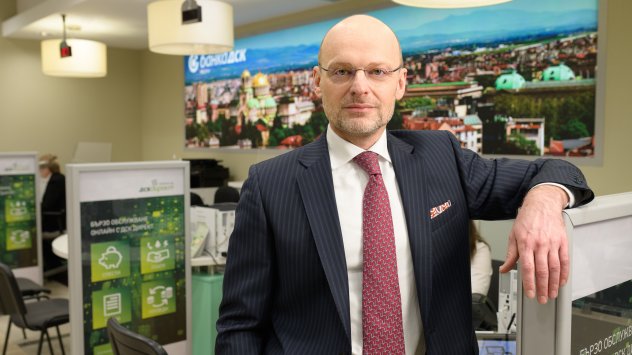
Each company should set specific goals how to set up and use policies for еnvironmental, social, and (corporate) governance (ESG) while doing what it does best. With ESG there can’t be difference between short-term and long-term goals. It is about going step by step towards achieving sustainable development. This is what Tamash Hak Kovach, chairman of the Administrative board and chief executive officer of DSK Bank said in the “Made in Green” rubric of Roselina Petkova in the TV broadcast “In progress”.
“As the largest bank on the local market, we have a high share of funding the renewable energy sources and innovative infrastructure and funding our tens of thousands clients has the biggest effect. From a regulatory point of view, there are many goals but one of the most important ones is to reduce the overall carbon footprint of the bank to almost zero and we can achieve it in a year or two. In the ESG sphere, our last project is the partnership with MasterCard – Wildlife Impact Card.”
The card is made by recycling materials and the project itself is basically large-scale educational program for environmental protection. For each issued MasterCard Wildlife Impact card, DSK Bank and MasterCard donate to the international organization Conservation International to help for the protection and restoration of wildlife habitats.
“This is a great example – we contribute to one of the most important goals of sustainable development – climate action. We have a partnership and through it, we can implement it into society. I don’t say that each of our two million clients will use our card but even if small part of them get this message, it will be very important.”
There are four instruments that influence the business developing of its ESG policies – regulatory and market pressure, corporate social responsibility and most important is to do only what the business is made for. Market pressure is not as significant in the area of financial services, but it is not so important about the importance of regulations that help determine the impact of business on the environment, Hak-Kovach said.
The effects from the regulatory pressure are simple but hard to achieve. If the business does not measure its influence on the environment, it can’t set goals. "Over the next few years, through ESG measurement, targets will be part of day-to-day banking processes, as we now measure credit risk. This takes time because you need to build measurement systems first."
As a banking group, DSK has many different opportunities to act in ESG sphere through its different subdivisions. “City development fund is focused only on sustainable cities and communities – we fund public transport, parks, cultural events. DSK Leasing is focused on the infrastructure and DSK Pension fund is focused on the lack of poverty. The most important task for the bank is the partnership with other organizations – to help our clients to contribute to the goals of sustainable development. "
DSK separates its corporate social responsibility to four spheres – children and education, sustainable cities, nature and environment and volunteering.
“We provide financial services but there is an external pressure – from clients, employees and regulators. However, there is no need for us to be forced. This is our business”, said Hak-Kovach and added that the companies become more and more perceptive towards ESG policies.
“For a lot of our clients this makes sense from financial point of view, because it improves the processes effectiveness… It is very important every corporation to define what exactly it want to achieve – this could mean corporate social responsibility or it could be just an economical logic which is perfectly fine.”
It is possible the current changes in the global situation to speed up the changes towards a better sustainable in two main aspects, according to Hak-Kovach.
“The current crisis is primarily focused on the energy sector and this is a good opportunity to ensure the transition to renewable energy. This will have a double effect in this situation – regarding the climate goals and we will be less dependable from geopolitical risks.”
High inflation, in turn, will affect many people and can cause changes in consumer habits. "Prices are a signal in economic theory – the higher the price, the more we pay attention to our consumption. I am absolutely sure that more and more attention will be paid to responsible consumption."
Need is the mother of innovation, reminds us Hak-Kovach and according to him we might witness new practices when it comes to responsible consumption and sustainability.
“ESG us a very strange abbreviation and it can mean both anything and nothing. My opinion about ESG is that this is the contribution of the corporations to the UN’s global goals for sustainable development. These goals are related only to the climate and the sustainable development – there are also sustainable cities, gender equality, good jobs, lack of poverty. I believe that the most important from the corporations’ contribution to these goals is to do what we can do – we are a financial institution and to us it is most important to use this ability to contribute to the purposes of the sustainable development.



